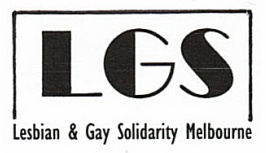


This article was in Newmatilda on 10 JUNE 2011
A fear of persecution based on sexuality is grounds to claim refugee status in Australia - but DIAC has some strange ideas about gay and lesbian identity, writes Senthorun Raj
When did clubbing and being sexually active become the reference points for measuring someone’s sexuality? Recent decisions by the Department of Immigration and Citizenship (DIAC) and the Refugee Review Tribunal (RRT) suggest that Western cultural stereotypes prevail in the determination of sexuality-based asylum claims.
The Refugee Convention 1951 outlines that asylum seekers must demonstrate a well-founded fear of persecution on the basis of a protected ground to be considered a refugee. The protected categories include ethnicity, nationality, religion, social group or political opinion. In Australian law, sexuality, or specifically "homosexuality", has been considered a protected identity under the category of "social group" since Morato’s case in the Federal Court in 1992.
Historically, claims made by sexual minorities have been met with resistance from decision-makers who have argued that persecution can be avoided if the asylum seeker chooses to remain "discreet". Stereotypes underlying the need for discretion are predicated on the assumption that gay men are excessively promiscuous, often seeking sex in public, and dangerous to the mores of society. These social imaginaries characterise any form of public affection as indicative of "overt sexual activity" that should be "rightly" condemned.
A 1999 case concerned a Chinese asylum seeker who was beaten and detained for three months for kissing another man in public. The Federal Court sought to dismiss the claim on the basis that Gui lacked appropriate discretion with respect to Chinese cultural norms and ought to have engaged in his display of homosexuality privately. In 2003 these discretion tests were rejected by the majority of the High Court — but the moralising rhetoric that underpins the so-called need for discretion continues to haunt current decisions.
Conversely, female applicants often face the opposite problem. Their claims are deemed to lack credibility because they do not conform to a highly visible stereotype of public promiscuity and consumption. In a 2008 case, a female applicant from Mongolia was questioned because her experiences of intimacy were not highly public or visible. The judge said:
"I accept that the applicant has a girlfriend and that she has had a close relationship with this friend since [year] I have doubts as to whether their relationship is a lesbian relationship as the evidence as to how they first met and their lack of involvement in the lesbian community is of concern. Further the applicant gave little details of the nature of the relationship and I felt she was being evasive as to the real basis of their friendship."
While the applicant in this case was found to be a refugee, the association between her claim to a lesbian identity and the lack of involvement in the public "lesbian community" in her country of origin limited her credibility. As the applicant did not travel with her partner and chose not to come out publicly, the RRT defined their intimacy as platonic rather than sexual. Moreover, the fact that her partner spoke a different language was also seen to undermine the applicant’s credibility, as speech is privileged by the RRT as foundational to romantic intimacy. Her evasion of questions in the application process was seen by the RRT as an indication of non-genuine lesbian sexuality. According to the Tribunal, the "real basis" of the relationship is limited strictly to a friendship that is misconstrued in the applicant’s home as homoerotic.
Many of the current administrative decisions in Australia rely on what academics Laurie Berg and Jenni Millbank term a "sexualisation of the narrative". That is, the sexual experience of the refugee must fit into composite story involving visible (read: "out") participation in a "scene" or community.
In a case from 2010, a male Indian applicant outlined the difficulties he had with such participation:
"In India, I was too afraid of seeking out the gay subculture. I had already been threatened and harassed and did not want to place my life in any more danger. I was not even aware that there was a gay subculture as it is not widely advertised. There were no gay publications such as magazines and books available in newsagents where I lived, that I could just buy and find out about gay events. Just because I did not try to engage in that culture does not mean that I am not homosexual."
Knowledge of sexual cultures is crucial to assessing the credibility of claims like this. When decision makers from DIAC locate sexual identity in a particular national context, they implicitly nod to an idea about a "gay subculture". It’s often unclear what this actually means — and then the applicant’s claim is refused because of his lack of interaction with it. The vague notion of a subculture fails to consider the many different ways sexualities are negotiated in public cultures — and it also assumes applicants have the means and social mobility to access such spaces.
Paradoxically, the same stereotypes also get used to discredit applicants if a decision-maker believes them to be performing them disingenuously. In May 2011, a lesbian asylum seeker from Uganda had her claim rejected, because her relationship with another woman was considered suspect. According to the DIAC delegate, she "had merely adopted the persona of a homosexual" for a protection visa. The applicant responds by noting, "I have kept my homosexuality private in Uganda because I fear for my life. It is for this reason that I did not directly associate with or join lesbian groups".
Asylum seekers are in a double bind. If they remain closeted about their sexuality, or choose not to participate in the "scene", they lack the public visibility to be considered genuine. However, as the case with the Ugandan refugee, if you present what appears to be a convenient "homosexual persona", you may be discredited.
While the RRT in this particular case eventually found the claim to be valid, the proceedings nonetheless suggest that there there is a universal public "homosexual persona" that a person is capable of adopting. Specifically, the assumption that lesbian sexuality relies on public socialisation remains uncontested. Following this logic, sexuality can only be recognised when it manifests in public terms, unless coercion or fear of violence limits its expression to the domestic sphere.
When asked what guidelines were used to determine the veracity of claims based on sexual orientation, a spokeswoman for the Department of Immigration told New Matilda that DIAC does have "gender guidelines" that cover issues relating to sexuality-based claims, but that these are not publicly available. She said decision-makers are also referred to the international UNHCR guidelines (developed in 2008) on processing asylum claims from people of diverse sexual orientations.
However, when taken together the decisions listed above reveal a lack of consistency. Assessment of claims for asylum by a sexual minorities relied on reasoning that is often paradoxical. Moreover, judging claims against a mythic or stereotypical "persona" privileges consumerism or promiscuity as the authentic markers of non-heterosexuality. Such moves obscure how asylum seekers negotiate their intimate lives and sexualities in specific cultural and historical contexts.
Ultimately, illogical or unreasonable decision-making on the part of administrators can be attributed to parochial understandings of sexuality and a lack of empathy. Judicial review is available for such decisions but courts are limited to considering jurisdictional questions or errors of law, rather than determining the merits of the decision. Reforms to administrative decision-making then, must focus on eroding stereotypes and embracing culturally specific merit assessment guidelines, to avoid dismissing the genuine risks faced by so many gay and lesbian refugees.k

The following editorial was in the Sydney Morning Herald on 9 August 2011:
IT HAS long been policy on boat arrivals, not asylum seekers themselves, that has tested the limits of the law. The courts' insistence that policy must be subject to legal review has been a repeated irritation for politicians driven by the political need to stop the boats. In 2002, the Federal Court summoned then immigration minister Philip Ruddock to explain remarks that verged on contempt. Yesterday, the Gillard government's plans were thwarted by a High Court decision to extend its injunction against deportations to Malaysia. Only last year, the court reasserted boat arrivals' right of access to the legal system. The full bench will now consider the lawfulness of deporting recent boat arrivals.
The policy premise of the Pacific and Malaysian solutions is that boat arrivals, a small minority of the asylum seekers who reach Australia, can be excluded from the usual application of the Refugee Convention and domestic law. The Howard government's excisions of territory from the immigration zone revealed concern about the legal status of its policies. Last year's High Court decision meant the lawfulness of key policy elements can be tested.
Refugee advocates have now put two essential points of law to the court: that all asylum seekers arriving in Australia have a right to have their claims assessed here; and that Immigration Minister Chris Bowen's declaration that Malaysia, which is not a Refugee Convention signatory, has adequate rights protections should be subject to review. Refugee lawyers say the minister is further obliged as legal guardian of unaccompanied minors to act in their best interests. The courts can no longer be shut out from hearing these arguments. The rule of law depends on every individual having recourse against oppressive, arbitrary or unlawful government action. The Gillard government, like its predecessors, now pays little more than lip service to legal and humanitarian principles. It has shrugged off challenges to its treatment of boat arrivals. Perversely, given its record in office, the Coalition expresses concern about inhumane treatment and hails the court injunction as a blow to Labor's plans to deport boat arrivals.
In truth, both sides of politics have flouted the spirit and intent of the Refugee Convention. It is seen as electoral folly to stand up for human rights, fairness and justice. Policy follows a brutal political calculus: boat arrivals, few as they are, must be stopped by punitively detaining and deporting them as a deterrent to others. This says little for Australians' commitment to a fair go, whatever the court's eventual ruling.

The following letters were published in the Sydney Morning Herald on 9 August 2011:
Headlines reporting a legal challenge has put the so-called ''Malaysian solution'' on hold are among the most gladdening of the year and the Gillard government should read it as a signal that it needs to stop being part of the problem (''Court freezes asylum deal'', August 8). Its blind insistence on portraying Australia as an international bully boy on this issue only discredits all Australians.
The refugee lawyer David Manne, heading up the legal team on behalf of 42 asylum seekers (including six unaccompanied minors), needs to be applauded for his efforts. His injunction victory is a significant step towards reinstating Australia's humanitarian standing within the international community.
Brian Haill Frankston (Vic)In my wildest nightmares I never imagined an Australian government would even contemplate forcibly deporting desperate children who came here asking for asylum. The whole political debate (on both sides) has been beset by tedious cliches and mindless platitudes: ''border protection'', ''stop the boats'', ''sending a message'' and ''no blanket exceptions''.
Not much is heard about human welfare. The debate is driven by the notion that most Australian voters retain the old fear that we are in constant danger of being overwhelmed by people on boats, to the extent that one day the population will change colour.
Government and opposition both see votes in keeping us frightened, nonsensical as the notion is.
John Howard's so-called Pacific solution was bad enough, proceeding as it did from the ignoble motive of keeping people away from the reach of Australian courts. I am afraid, however, that Julia Gillard and Chris Bowen are increasingly making John Howard look like Father Damien of Molokai.(our bold and italics: Eds.) Can they not show a little humanity?
Ian Barker, QC BerryDoug Richards does not believe people arriving by boat are ''asylum seekers'', preferring to use his own definition. Fortunately, we do not have to rely on the whims of individuals for legal definitions - the phrase ''asylum seeker'' applies to individuals whose refugee status has yet to be determined. That is exactly what people arriving by boat are.
Samantha Chung NewtownNo, Rosemary Kinne (Letters, August 8), Joe Hockey deserves no credit for any belated intervention he may be making on behalf of unaccompanied minors threatened with deportation to Malaysia. He has stood by for years while his leader and opposition spokesman for immigration whipped up community hysteria about boat-borne asylum seekers quite disproportionate to the tiny dimensions of the issue.
Hockey has remained virtually silent as Tony Abbott and Scott Morrison have played upon the unfounded concerns of the credulous and fearful.
Whatever errors the government may have made on this issue, Hockey has been a complicit policy arsonist on the Coalition side and should not now seek to claim credit as a firefighter.
Ian Brown Hunters HillThe only thing the Coalition fears more than the boat people is that Labor's Malaysian policy might actually work to deter them.
Walter Lee Glebe
The following article was in The Age newspaper:
The majority of Australians believe asylum seekers arriving by boat should be allowed to land and have their claims assessed here, an opinion poll has found. Photo: Yuli Seperi A MAJORITY of Australians believe asylum seekers arriving by boat should be allowed to land in Australia and have their refugee claims assessed here, according to an opinion poll commissioned by The Age.
In a rebuff to the policies of both Labor and the Coalition, only 28 per cent of poll respondents said people arriving by boat should be sent to another country to be processed, while 53 per cent favoured assessing them in Australia. Fifteen per cent said they should be sent back to sea.
The Age/Nielsen poll comes as the Gillard government waits for the High Court to determine the legality of its ''Malaysia solution'' policy, under which Australia has agreed to resettle 4000 refugees from Malaysia in exchange for it taking 800 people who arrive here by boat. The controversial deal has been on hold since last week after refugee lawyers secured a High Court injunction against the deportation of the first asylum seekers.
Yesterday, the Australian Human Rights Commission joined the fight, signalling it would support the cases of six unaccompanied children who are among those facing deportation to Malaysia.
The poll of 1400 people, taken from last Thursday to Saturday, comes ahead of the 10th anniversary of the Tampa incident, which brought the start of the Howard government's Pacific solution to process asylum seekers offshore.
Among those who back processing here or overseas, almost two-thirds want asylum seekers held in detention. Only one-third say they should live in the community while their claims are dealt with.
Of the 53 per cent who favour processing in Australia, more than half (55 per cent) want asylum seekers detained, while 41 per cent say they should live in the community. Those who want offshore processing take a harder line, with more than eight in 10 favouring detention.
Six in 10 of those who support either onshore or offshore processing say people found to have genuine claims should be allowed to stay in Australia permanently. More than a third would permit them to stay only until it was safe to return home. Three per cent say they should be sent back to their country of origin regardless of the outcome of the assessment. Of those preferring assessment in Australia, 70 per cent say genuine refugees should stay permanently. But of those favouring assessment overseas, only 40 per cent would allow permanent settlement here.
Pollster John Stirton said the issue was difficult to poll because of the influence of the questions' wording. He said this poll had stripped questions of context to make them as neutral as possible, affecting comparison with other polls.
Meanwhile, lawyers for the 42 asylum seekers facing deportation to Malaysia have questioned the filing of an affidavit on the weekend by Immigration Minister Chris Bowen expanding on his reasons for declaring it was safe to send them to the country.
Debbie Mortimer, for the asylum seekers, argued that the sworn document was an attempt after the legal challenge was initiated to defend the case.
In his affidavit, Mr Bowen said that after eight months of discussions with Malaysian officials, he had formed a view that the country had made a ''significant conceptual shift'' on its treatment of asylum seekers.
But Victorian Labor backbencher Anna Burke said yesterday she was very concerned that Australia could not guarantee the safety of asylum seekers who will be sent to Malaysia. She also criticised the government's proposed reopening of an asylum seekers processing centre on Papua New Guinea's Manus Island, telling the ABC the move was a return to the Pacific solution of the Howard government.

The Age newspaper analysis by Michael Gordon:
August 16, 2011It's no surprise that many Australians have little sympathy for asylum seekers who flee persecution and seek sanctuary in this country in boats without an invitation.
You only have to listen to talkback radio, or read the letters pages of the newspapers, to appreciate just how hostile some people are - like the one who sent a text message to the ABC's Jon Faine last week claiming that refugees were responsible for the mayhem in London.
But it is a surprise that most Australians believe these people should have their claims assessed in Australia, rather than overseas.
This puts them at odds with both Julia Gillard and Tony Abbott and the perception that attitudes have hardened against asylum seekers, particularly since the riots at the over-crowded Christmas Island detention centres earlier this year.
Today's special Age/Nielsen poll reveals that most of those who believe asylum claims should be processed here support permanent protection in Australia being afforded to those who are found to be refugees.
In other words, there remains a huge reservoir of support and humanity towards those who are found to have a well-founded fear of persecution in their homelands.
But there are also some hard-hearted attitudes, especially on the question of mandatory detention of asylum seekers while their claims are processed, including the detention of children. Almost two-thirds of those who support claims being assessed believe asylum seekers should be held in detention. Almost a third support children being placed in detention.
Moreover, 15 per cent of those polled support turning boats back to sea without assessing the claims of those on board, while almost one in three support only temporary protection being given for refugees.
A decade after the Tampa episode, the poll points to a nation that is deeply divided on this issue but ultimately, if narrowly, leaning towards compassion and open to persuasion on the best way forward.
The problem just now is that both sides of politics have accepted that the only way to stop the boats is to smash the people smugglers' business model by punishing those who use their services.
The contest is between a return to a system that damaged vulnerable people by putting their lives on hold for years, and one that combines one element of that approach - detaining asylum seekers indefinitely on Papua New Guinea's Manus Island - with the gamble that is the Malaysia people swap.
There is a better way, one that would find favour if communicated in measured tones.

Article in The Age newspaper:
JANUARY TO JUNE
THE full extent of despair and unrest in Australia's immigration detention centres has been exposed, with documents showing 1507 detainees were hospitalised in the first six months of this year, including 72 psychiatric hospital admissions, and 213 treated for self-inflicted injuries.
The documents, released to a parliamentary committee by the Department of Immigration, also show more than 700 detainees were treated for ''voluntary starvation''. And it emerged that police had been notified 264 times of possible criminal behaviour in detention centres.
The figures were released as Australia's top immigration bureaucrat last night urged MPs to rethink mandatory detention of asylum seekers and asked whether the hardline policy actually deterred boat arrivals.
In an extraordinary opening address to the inquiry last night, Andrew Metcalfe, secretary of the Department of Immigration and Citizenship, urged a more flexible approach.
The inquiry was instigated by the opposition and Greens, and has begun to lift the veil on the secretive private contractor, Serco, that runs Australia's detention centres.
Hundreds of pages of data supplied to the inquiry by the department include the time and nature of every recorded incident inside the nation's 19 detention centres.
However, Serco is refusing to state how many staff it employs at each centre, claiming this is sensitive. The department told last night's hearing that Serco was not required under its contract to meet any staff-to-detainee ratios.
Mr Metcalfe said Serco was refusing to disclose its staffing ratios because it was concerned detainees would find out.
Last night's hearing was also told that Serco had been fined every month in 2010-11 for failing to meet contract goals.
Serco has reported 871 instances of inappropriate behaviour towards its staff, and 700 instances of inappropriate behaviour between detainees. There have been five substantiated complaints against staff - but no resulting dismissals.
In June alone, there were 135 critical incidents across the network, covering multiple serious injuries, assaults, two escapes and self-harm.
Christmas Island is particularly plagued by suicide attempts. There were 620 self-harm incidents there in the year to June, including 193 actual acts, 31 serious attempts and 476 threatened acts. The island's four detention centres were over capacity on 27 occasions. Hunger strikes were reported at most centres, and at least 17 cases of children starving themselves were noted in the past year.
The surge in incidents began in mid-2010, coinciding with a rise in boat arrivals.
Opposition immigration spokesman Scott Morrison said the data revealed the detention system had collapsed, with the government sitting ''in policy denial'' while centres filled. Greens senator Sarah Hanson Young said she wanted more details, including the daily cost of operating the network.
Mr Metcalfe said rising unrest, self-harm and suicide were unfortunate and sad, but ''defy simple solutions''.
Although he stressed that public servants did not engage in philosophical debate, his address amounted to a call for more creative thinking. "We are professional public servants who are working hard to serve the government of the day - doing the best we can in, at times, very challenging environments,'' he said.
After urging the committee to examine the balance between meeting Australia's obligations to refugees and the need for strong border controls, he asked: "Can we manage different cohorts, with different success rates or security and risk features, in different ways?" Among the questions he posed were whether detention was a deterrent and whether it actually facilitated the resolution of cases.
"What range of facilities should be utilised? For how long is an immigration arrival and status determination process in a detention centre environment required? There are many questions for you, as parliamentarians, to consider."
Mr Metcalfe highlighted the success of community detention, which has resulted in 1765 people being approved for community placement since October last year.
A spokesman for Immigration Minister Chris Bowen said the government was ''open and accountable'' and acknowledged the pressure on the detention network. The spokesman said that after reforms to processing made this year, the number of asylum seekers in detention had fallen by almost 2000 since April.

Letters in The Age newspaper:
I WAS deeply ashamed to read the statistics on asylum seekers in detention (The Age, 17/8). In the light of these appalling figures on self-harm and despair, why is it that the only voice of humanity is a public servant, albeit the secretary of the Immigration Department, who raises the issue of extending community detention?
I am so disillusioned and ashamed of the poll-driven, wedge politics that drives debate on asylum-seeker policies. I am heartily sick of the voices of extremists being given credence and I loathe the fact that no one wants to honestly talk about the elephant in the room, which is that this debate and fear of asylum seekers is driven by ignorance, racism and a lack of humanity.
Where is our compassion? Where are our brave policymakers? I guess they are too busy reading poll results.
Helen Buckingham, Mont AlbertWHO could have imagined that the present Labor government's policies regarding refugees would be more dysfunctional than those of the Howard government? Rather than considering basic humanitarian principles, the Gillard government has been spooked by Tony Abbott's mindless ''stop the boats'' mantra, which regrettably appeals to fear and the lowest levels in our human nature.
John Howard was successful in demonising ''boat people''. Now the Gillard government has further denigrated them into commodities, to be traded for other unfortunate refugees in Malaysia. The policies of both government and opposition are cruel, expensive and foolish. Most people who risk their lives to come by boat eventually obtain refugee status, as they did during the Howard government's time. Policies based on principles of decency, common sense and function would advance Australia fairly.
Jean Jenkins, Safety Bay, WATHERE has been a puzzling historical paradox in the extreme concern shown by both major parties for the well-being of asylum seekers on leaky boats in transit to Australian territory.
While politicians exaggerate the risks desperate, traumatised people take to get here, they have no qualms about dehumanising them further in remote, often climatically hostile locations at huge public expense before turning them loose in society without jobs, housing or access to healthcare.
If you want to damage people's minds to the point of self-harm and suicide, you isolate them behind high fences, keep them in conditions of prolonged uncertainty, locate them where lawyers, the media and ordinary people cannot easily access them to hear their individual stories, and take away their hope.
Sounds rather like torture to me.
Sue Currie, NorthcoteI JUST emailed my MP asking for his support to ban the live export of animals. I'd better email him again about our other potential live animal exports - humans seeking asylum. Most of them will be found to be genuine refugees. Transportation of live humans and other animals is always inhumane, whether in the 1700s or the 21st century. Keep on saying so, Australians.
Linda Bennett, BrunswickFIRST it was the Aborigines, whom we shot and poisoned. Then it was the Chinese, on whom we slapped the White Australia Policy, then massacred at Beechworth. Then it was the Moaning Poms, Dagos and Wogs, not to mention those New Australians.
Then it was the Slant Eyes, all of whom came here for a better life, and, in most cases, achieved it. And the latest in the firing line? Women and children on a crappy boat, desperate for a better life. And what do we do? Pack them off to somewhere else.
Advance Australia Shame.
Barry Revill, MoorabbinEditorial in The Age newspaper 18 August 2011
THE Coalition and Greens instigated a federal parliamentary inquiry into immigration detention two months ago. The terms of reference require the committee to inquire into and report on, among other things, the effects of detention on asylum seekers and their wellbeing, reasons for riots and unrest, and ''the impact, effectiveness and cost of mandatory detention and any alternatives, including community release''. Yet MPs seemed surprised at the opening address by Immigration Department secretary Andrew Metcalfe, who urged the politicians to consider the human impact, costs and effectiveness of mandatory detention and to look at the alternatives. Evidence to the inquiry leads naturally to such questions, yet the major parties are deaf to his call.
Labor and Coalition members' failure to pursue Mr Metcalfe's line of reasoning betrayed their focus on playing politics instead of seeking better, more effective and humane policy. Opposition immigration spokesman Scott Morrison - apparently under the impression that the Coalition, not Labor, invented mandatory detention - immediately demanded the government clarify its position, saying Mr Metcalfe's remarks sent the wrong message to people smugglers. In a swift response, the government made ''no apologies'' for mandatory detention as ''an essential component of border control''.
If only politicians and the public had regard for the facts and for Mr Metcalfe and his department's insights. They should listen properly to what he had to say. The human costs are out of all proportion to the few thousand held in detention. Up to July, 1507 detainees were hospitalised this year, including 72 psychiatric admissions and 213 for self-inflicted injuries. More than 700 were treated for ''voluntary starvation''. Detention costs soared to $772 million in 2010-11. The statistics and the rhetoric are all depressingly familiar - those responsible show no sign of acknowledging the unjustifiable costs of their policies.
What does Australia have to show for this? Mr Metcalfe even asked: ''Is immigration detention a deterrent?'' It has been in place since 1992 and did not stop almost equal waves of boat arrivals in 1999-2001 and 2009-11. Mr Metcalfe pointedly highlighted the success of the alternative approach, under which 1765 people, including 841 children, have been put in community detention since last October. He would like community programs expanded as a less costly, more efficient and humane policy. The major parties still seem determined to defy reason, squander public money and sacrifice asylum seekers on the altar of politics.
Article in The Age newspaper on 18 August 2011
THE federal government has affirmed its commitment to the mandatory detention of asylum seekers, as the leading doctors' group last night slammed the policy as ''inherently harmful to the physical and mental health of detainees''.
A parliamentary inquiry has highlighted the difficulties of the troubled detention network, which has been plagued by riots, self-harm and overcrowding, with 1507 detainees hospitalised in the first six months of this year.
Australian Medical Association president Dr Steve Hambleton last night used an address to the association's parliamentary dinner, attended by Prime Minister Julia Gillard and Opposition Leader Tony Abbott, to send a message to both sides of politics: ''The policy of mandatory detention and the remote location of most detainees mean that the health status of detainees continues to decline.''
He said the harm to children was particularly acute.
Refugee Council of Australia chief executive Paul Power said the incidence of self-harm ''is beyond anything we have previously seen in Australia'', and the policy was ''profoundly stupid and counterproductive''.
The federal government says mandatory detention is not used as a deterrent, but enables processing of asylum claims. Mr Power said if this was the case, the detention period should be restricted to a matter of weeks, and the same checks used for tourists and temporary visa holders should apply.
Appearing before the parliamentary inquiry into the detention network on Tuesday night, Immigration Department secretary Andrew Metcalfe raised a series of questions for MPs to consider: How should reception of asylum seekers be managed; whether detention was a deterrent or there to facilitate processing; could different cohorts of asylum seekers be managed differently; and how long should processing in detention take?
Opposition immigration spokesman Scott Morrison and Greens senator Sarah Hanson Young, who sat on the committee and did not question Mr Metcalfe's comments at the time, yesterday leapt on suggestions he had questioned the mandatory detention policy.
A spokesman for Immigration Minister Chris Bowen said Mr Metcalfe was referring to the terms of reference of the inquiry, and not expressing a view. Mr Bowen's office had seen a copy of Mr Metcalfe's opening address before it was tabled.
Senator Hanson-Young said Mr Metcalfe's opening statement was ''extraordinary''. ''The questions that the secretary of the department was putting … [are] the exact same questions that the Greens have,'' she said.
Mr Bowen's spokesman said: ''The government's position is clear: mandatory detention is an essential component of border control and we make no apologies for detaining unauthorised arrivals for checks of health, identity and security risks to the community.''
Meanwhile, the Senate yesterday agreed to an inquiry into the Malaysia refugee swap. The full High Court will consider next Monday whether to lift an injunction on the first transfer of asylum seekers to Malaysia.

Article in The Age newspaper on 19 August 2011
A MENTAL health nurse has been sacked from a Darwin detention centre for saying she believes mandatory detention contributes to mental illness in asylum seekers.
A letter sent by her employer, International Health and Medical Services (IHMS), and obtained by The Age, says her job was terminated last Friday after Serco detention centre managers and Immigration Department staff complained that she was ''expressing negative political opinions'' about detention.
The federal government's Detention Health Advisory Group, the Australian College of Mental Health Nurses and the Australian Psychological Society yesterday called for mandatory detention to be abandoned. Their call came after documents submitted to a parliamentary inquiry showed high levels of self-harm, with 213 detainees treated for self-inflicted injuries and 700 for ''voluntary starvation'' in the first six months of this year.
The chairwoman of the advisory group, Professor Louise Newman, said she was concerned that a political view could be held against a health worker.
IHMS spokeswoman Melissa Lysaght said last night that staff were entitled to political opinions but needed to work in a team environment.
''In fact, that is not a reason for terminating someone, because everyone is entitled to a political opinion,'' Ms Lysaght said. ''In hindsight, the phrasing of the letter was incorrect.'' She said the woman had been sacked for professional standards reasons, after working there for two weeks.
Amanda Gordon, of the Australian Psychological Society, said yesterday there was clear scientific evidence of the harm caused by indefinite detention, which ''exacerbates trauma, and creates mental illness, in contravention of the government's own commitment to reduce it''.
Australian Medical Association president Steve Hambleton said yesterday his attack on the mandatory detention policy at the AMA's parliamentary dinner this week had been prompted by ''terrible stories'' being reported by paediatricians and psychiatrists who went inside detention centres. Dr Paul Bauert, director of paediatrics at the Royal Darwin Hospital, said children as young as four and five had been caught up in hunger strikes that their parents were involved in, and were treated at his hospital. ''They weren't eating and required intravenous and gastric drips,'' he said.
Although the federal government is shifting most families and children into community detention, Dr Bauert said more than 179 children remained in detention in Darwin.
The opposition's immigration spokesman, Scott Morrison, meanwhile, said the 800 asylum seekers to be deported to Malaysia would be worse off, and 13 mental health workers would be needed to match the ratio of health workers to detainees in the Australian detention network.
¦The government of Manus Island last month requested Australia fund 28 projects, including a new technical high school, a broadband network and international conference centre, in return for Papua New Guinea agreeing to host an refugee processing centre there.

Article in The Age newspaper on 22 August 2011
PROMINENT business and union leaders have endorsed a new strategy on asylum seekers that would have mandatory detention phased out within two years and Australia's intake of refugees significantly increased over five years.
Heather Ridout and Janet Holmes a Court, along with ACTU chief Ged Kearney, are among more than 30 well-known Australians to back the strategy.
The strategy's release today will coincide with the beginning of a full High Court hearing of a challenge to the Gillard government's "people-swap" agreement with Malaysia.
Published by the Centre for Policy Development and written by former bureaucrats John Menadue and Arja Keski-Nummi and academic Kate Gauthier, it argues asylum policy should be based on an appeal to the "better angels of our nature - not on half-truths masked as fact, or political cowardice".
Although the policy opposes offshore processing, it does concede that the Malaysia agreement "can become a catalyst to start the process of building a durable protection system in the region and delivering protection dividends for all asylum seekers".
The deal to send 800 boat arrivals to Malaysia in return for accepting an extra 4000 refugees from that country is being challenged because of doubts about whether protection for the 800 is real and enforceable.
The apparent arrest and deportation from Malaysia of about 18 members of the Uighur ethnic minority - reported in The Saturday Age - has underscored doubts about whether Kuala Lumpur is capable of honouring its commitment under the deal to uphold the human rights of the asylum seekers.
A spokesman for the United Nations High Commissioner for Refugees said the agency remained "very concerned" about the fate of those arrested.
Mr Menadue argues that until Australia can overcome its "collective paranoia" about boat arrivals, it will be difficult to achieve sensible decision-making. "The number of asylum seekers coming to Australia is minuscule and three-quarters of them come by plane and are not detained," he said.
The strategy paper, A New Approach, Breaking the Stalemate on Refugees and Asylum Seekers, says Australia should follow international practice and consider those who claim asylum in Australia separately from the number of refugees accepted from offshore.
"De-linking the offshore and onshore numbers will also go some way towards nullifying concerns that asylum seekers (especially those who arrive by boat) 'jump the queue' and deny resettlement for a person in a camp," the paper says.
It says Australia is the only nation with mandatory detention, yet "we see far fewer asylum arrivals than other countries and host far fewer of the world's refugees. In 2010, Australia ranked 46th in the world for the number of refugees per capita".
Those backing the strategy include former Liberal leader John Hewson, eminent scientist Sir Gustav Nossal and prominent figures in the arts including playwright David Williamson and novelist Thomas Keneally.
"With genuine political will there is no reason why Australia cannot move away from the corrosive and divisive state of the current debate and back to the bipartisan approach which served Australia so well for so long,'' Ms Ridout, chief of the Australian Industry group, said.

The following article was published in the University of Western Sydney's GradLife alumni journal - Volume 3 Issue 2 November 2011. It is an article of such importance as to merit publishing it in as many places as possible to give the matter as much publicity as possible:
UWS Law School Professor Michael Head reviews the controversial Malaysia Solution.
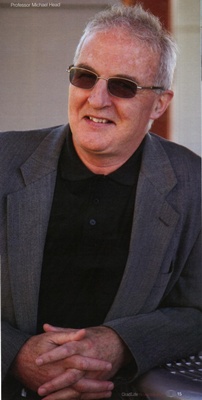
Inflated claims have been made by some lawyers about the August 31 High Court ruling on the refugee 'Malaysian Solution' - such as that the court has become a 'people's court' and a de facto court of human rights.
In reality, the court's decision was an extremely narrow one. It leaves in place the system of 'onshore' detention within Australia - a system that denies fundamental legal and democratic rights to asylum seekers, such as to seek political protection without being penalised, and not to be detained without trial.
It should be recalled that in 2001, the High Court permitted the forced removal of the Tampa refugees to Nauru, and in 2004 the court ruled that the government could keep refugees detained within onshore Australian detention centres indefinitely, even in violation of international law, including the International Covenant on Civil and Political Rights.
The latest High Court decision was based on an interpretation of specific sections of the Migration Act and the Immigration (Guardianship of Children) Act.
In particular, section 198A(3) of the Migration Act was interpreted to reflect obligations under the international Refugee Convention. These obligations are minimal: not to deport someone who is officially classified as a refugee to face political persecution and not to punish people making protection applications.
As several judges made clear, the ruling does not prohibit other versions of so-called offshore processing, as long as they satisfy these very limited requirements.
The High Court decision leaves intact mandatory detention, that is, the imprisonment of all asylum seekers arriving in boats - a punitive regime that, in effect, violates the Refugee Convention by seeking to deter refugees from exercising their right to seek asylum. Australia is the only country to maintain such compulsory detention, which was first introduced by a Labor government in the 1990s.
Much of the commentary surrounding the court's ruling was guided by the conception that detention is acceptable as long as the Australian government remains in control of the process. This standpoint ignores the fact that the treatment of asylum seekers in Australian facilities is punitive and degrading, and has caused immense personal suffering.
Across Australia's detention network, incidents of self harm, most often through attempted suicide or mass hunger strikes, have escalated. According to statistics obtained by the Ombudsman from the Immigration Department, there were 1132 instances of actual or threatened self-harm in 12 months - an average of three per day. In just one week during July, there were 50 such incidents.
In line with the reaction of successive governments to any challenge by incarcerated refugees to the denial of their fundamental rights, the federal government has responded with repression, including the use of tear gas and rubber bullets. Desperate protests by inmates, attempting to draw public attention to their plight, have been met with the arbitrary removal of demonstrators to high-security prisons and threats by government ministers to retaliate by stripping refugees of their right to seek asylum.
The experience of the past two decades suggests that the conditions inside the detention centres will only worsen as asylum seekers wait longer and longer for decisions on their visa applications. The High Court late last year held that detainees on Christmas Island could not be denied access to the courts. Given the numbers of detainees and the lengthy nature of the official and judicial processes, however, many are likely to remain imprisoned, waiting months, if not years, for appeal outcomes.
The government's move to circumvent the latest ruling reveals a contempt for basic legal norms. Its draft legislation effectively repudiated the requirements of the Refugee Convention, placed all power in the personal hands of the immigration minister to declare any country an 'offshore processing country' in the 'national interest' and precluded any overriding vote by parliament.
More fundamentally, the entire political establishment, including the Greens, advocate some form of 'border protection' regime, which ultimately means using military force, in one way or another, either to physically 'turn back the boats' or to otherwise block refugees. Intrinsically, it denies the right to flee persecution and seek asylum, which means nothing if countries shut their borders.
Political and media commentators generally attribute this policy to widespread public hostility to refugees. An interesting opinion poll conducted by Fairfax Media, however, found just 25 percent support for 'offshore processing'.
To the extent that anti-refugee sentiment exists among certain layers of the population, it is largely the result of political and media campaigns aimed at fomenting xenophobic fears about the country being 'under siege' or facing 'invasion' by hordes of aliens responsible for driving 'Australians' out of jobs, lowering their wages and cutting their living standards. Such rhetoric has always been used in times of economic crisis to deflect domestic discontent away from the real culprits - the political and ruling elite and the profit system itself.
Not only the right to asylum but a more basic democratic principle is at stake in this issue: that all people should have the elementary right to live and work with full citizenship rights in any country of their choosing. Without that fundamental right they can be denuded of virtually any other civil and political right.

Article in The Age newspaper:

THE private company that runs immigration detention has been forced to back off an arbitrary ban on children using crayons and coloured pencils in their rooms.
Serco Group's officers in Darwin had decided on the ban, even though crayons are not listed as controlled or prohibited substances in the detention services manual. The Immigration Department could not point to any official reason for the ban yesterday.
Serco officers told a group of Darwin people, including three children, who had wrapped 80 art packs to give to 200 children at the Darwin Airport Lodge detention centre on Christmas morning, that the presents could not be distributed because ''the children might draw on the walls''.
It is believed that Serco had stopped child detainees from using crayons and pencils other than in group classes, and said they could not be used in family rooms, even under parental supervision.
The Greens and refugee groups said yesterday such a restriction would impair the development of young children, and was in breach of Serco's contract. ''Preschool children learn how to write by first learning how to mark paper with crayons,'' said Kate Gauthier, chairwoman of ChilOut (Children Out of Immigration Detention).
''It is a necessary part of the early childhood education process.''
Greens Senator Sarah Hanson-Young said: ''This is another classic example of why children should not be in immigration detention. Serco is under a contractual obligation to provide early childhood materials to children in detention.''
After protests to the Immigration Department by the Darwin residents, the Christmas presents, which included 100 individually wrapped gifts that Serco had unwrapped, were distributed on Thursday, 12 days after Christmas.
A Serco spokesman yesterday apologised for the delay, and admitted its process for checking the gifts ''did not work well in this case''.
Said Ms Gauthier: ''It shows Serco are not just heartless buggers for interfering with Christmas presents, but are breaching their contractual obligations.''
A department spokeswoman said: ''The department is very appreciative of the gifts delivered to clients by the Darwin Asylum Seeker Support and Advocacy Network, ChilOut and the wider Darwin community. We regret there has been this slight delay in this single incident, and understand most of the 200 children have now received their gifts.''
''Safety procedures'' were in force when goods entered a detention centre, she said. The Immigration Department's detention services manual lists controlled items, including alcohol, vitamins, phones with camera capability, computer modems, knitting needles, scissors, sporting equipment and religious candles, but does not mention crayons.

Letters in The Age 090112 – Serco and asylum seeker children:
KIRSTY Needham (''Detention centre operator backs off ban on crayons'', The Age, 7/1) reports that Serco, the private company our government employs to run detention centres has been banning children from receiving gifts of crayons.
Many of us have concerns about our immigration policies but this particular story really got to me. How monstrous, how depraved. And in our name.
And the departmental spokeswoman could only say: ''We regret there has been this slight delay.'' It was 12 days after Christmas before the kids got their crayons. Did she sing her statement? ''Twelve days after Christmas Serco finally allowed me to get …''
Gavin Mooney, Mountain River, TasmaniaIN DECEMBER 2001 I spent 10 hours in former senator Meg Lees' office packing up thousands of toys, pens, pencils, colouring books and games for the 320 kids who were stuck in the Woomera detention centre for Christmas. The night before Senator Lees was to deliver the parcels, we rang the prison and were told the toys were banned because ''soft toys could be fire bombs'' and because ''some adults had played up''.
The presents were finally delivered in impersonal plastic bags under guard in January. Not a thing has changed, with the innocent still treated worse than murderers.
Marilyn Shepherd, Angaston, SA
Article in The Age newspaper:
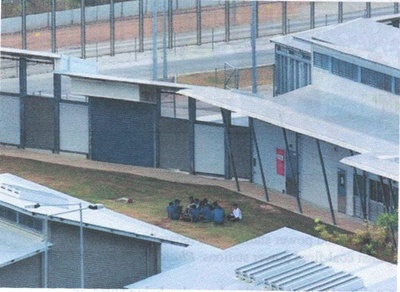 Detainees held at The Christmas Island immigration detention centre. Photo: James Brickwood
Detainees held at The Christmas Island immigration detention centre. Photo: James Brickwood
THE company that runs immigration detention is using a system of punishment and reward for misbehaving detainees, according to a document obtained by The Age.
The document conflicts with Immigration Department denials that such a system exists.
The Serco ''Behaviour Management Plan'' lists consequences for a detainee, including relocation, exclusion from a specific activity, being reported to the Immigration Department and the threat of the police being called.
The document requires Serco staff to record ''current restrictions in place for the client, such as access to activities, involvement in excursions''.
If the detainee's behaviour improves - or shows ''progress against any objectives set'' - the document records ''any changes to restrictions''.
The behaviour management plan clearly records the incident or behaviour that prompted use of the plan, and the ''desired change'' set by Serco that the detainee must meet by particular review dates to avoid continuing restrictions.
An Immigration spokeswoman said yesterday: ''We don't have a system of reward and punishment. There's no such policy.''
The department spokeswoman said detainees could be removed from a detention centre ''from time to time'' because non-compliant behaviour created safety issues for other detainees, but she stressed that this wasn't punishment.
''If they are non-compliant, it can have a consequence on where they are placed,'' she said. Sources said the document had been used for Christmas Island detainees sent to the isolation ''Red Compound'', and also the ''White Compound'', after self-harm attempts. Among the objectives detainees had been forced to sign to return to the general detention centre was that they would not commit further self-harm.
Despite the denial of a ''reward and punishment'' regime, the department's own detention services manual also details how the relocation of detainees, and denying them visitors, ''is a mechanism to assist in the management of unacceptable behaviour''.
A transfer can be used to ''restrict a person's movements for behavioural management reasons'', and also ''recognise compliant behaviour''.
The manual says warnings of a possible transfer should be made and recorded in the behaviour management plan.
Refugee advocates have raised concerns that sections of Christmas Island's North West Point detention centre are being increasingly used as management support units, including the use of isolation to change behaviour.
According to the manual, transferring a detainee to a management support unit should be a ''last resort''. It states that the only management unit remaining in the detention network is at Villawood, although Christmas Island has the ''capability to provide a secure facility''.
The manual refers to the 2005 Palmer report recommendation that the government review the use of management support units, and says the notorious Baxter centre used under the Howard government was decommissioned as a result. It is not appropriate to leave a person in a management unit for extended periods and alternatives must be examined after 48 hours, it states.
The department spokeswoman said there were ''various management units in different detention centres'', and refused to comment on Christmas Island's red and white compounds. Asked if they were being used for detainees who had committed self-harm, she said ''people can become non-compliant for various reasons''.

This video should be seen by all who value human rights and are horrified with what the Federal government and its loyal opposition have done to desperate people from countries Australia has invaded
MANUS ISLAND EXPOSED: A BRAVE WOMAN SPEAKS OUT!
Asylum seeker stories continue to be about disgusting governments and their persistence in demonising people - this time a gay couple in Brisbane - news items from SBS and Melbourne Community Voice on 7 Jan 2014:
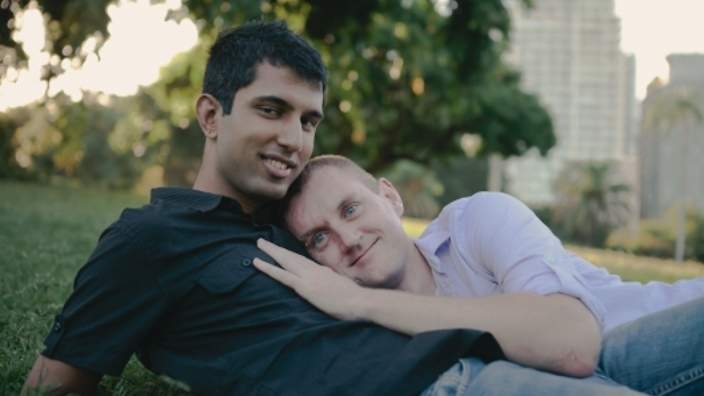
A gay Brisbane man has been given a short-term halt on his deportation to Pakistan where he faces jail time for his sexuality.
UPDATED 5:48 PM - 7 Jan 2014Ali Choudhry was due to be deported tomorrow from Brisbane, where he has been living for the past four years, the ABC reports.
Mr Choudhry and his partner, neuroscientist Dr Matthew Hynd, registered their civil union in March 2012.
But Mr Choudhry's application for a partnership visa was declined by the government, which ruled it did not consider him in "a long-standing relationship".
The couple has lodged an appeal to the decision with the Migration Review Tribunal (MRT).
Mr Choudhry was told this morning he will be allowed to stay in Australia beyond tomorrow’s deadline, the ABC reports. A petition created in support of the couple was delivered to Immigration Minister Scott Morrions's Sydney office today with more than 120,000 signatures.
Mr Choudhry was born in Pakistan but grew up in the United States.
*********************************************************************A gay man living in Brisbane for four years faces deportation this week following his application for a partnership visa being refused.
Ali Choudhry grew up in the USA and has been in a relationship with Brisbane neuroscientist Matthew Hynd for the past four years. The pair were among the first same-sex couples in Queensland to register their civil union in 2012.
Last month Choudhry's application for a visa recognising his relationship with Hynd was refused and if deported he faces harassment and possible life imprisonment in Pakistan for being homosexual.
Choudhry lost all his possessions in the Brisbane floods and has since set up a photography business in Brisbane, but is preparing for deportation this week. He has few contacts in Pakistan, cannot read or write the local language.
The couple cannot understand why their relationship is not considered a legitimate long-term partnership.
“We applied for a partnership visa to try and keep me here, and keep us together,” he told the ABC.
“For us, for whatever reason, it took about two years, and then even after all that time, it came back as a no.”
Hynd explained that Choudhry grew up in the USA, has never lived in Pakistan and is unfamiliar with the language.
“This is a country where he doesn't read the language, he can speak it, but how are you supposed to then get a job?”
Choudhry has lodged an appeal to the Migration Review Tribunal.
A spokesperson for Immigration Minister Scott Morrison said that same-sex couples are assessed no differently from heterosexual couples regarding immigration matters and while they cannot comment on individual cases for privacy reasons, all applicants must meet relevant criteria to be granted a visa and that these extend beyond whether there is a genuine and ongoing relationship.
“This incident highlights the difficulties the LGBTI community faces by not having equal relationship recognition in Australia, said ”Deputy Director of Australian Marriage Equality Ivan Hinton.
“Despite reform providing for equal treatment for all de facto couples, regardless of orientation, the ability to prove a committed relationship is easier when an applicant is married to an Australian citizen.
Hinton added that Choudhry claims an immigration agent had asked 'Why don’t you just marry an Australian woman?'
“It illustrates the important human rights protections and recognition that comes with marriage and this is currently denied to loving same-sex couples in Australia,” Hinton said.
To sign a petition to Immigration Minister Scott Morrison Don’t Deport Ali Choudhry go here

Article in The Age newspaper:


Injuries the men say they have suffered on the island nation. Photo: Supplied
Two gay refugees who fell in love at the Nauru detention camp say they are virtually prisoners in their home: holed up in fear for their lives after being bashed and verbally abused in a nation where homosexuality is illegal.
As Sydney prepares for Saturday night's Mardi Gras parade - an event that showcases Australia as a global model of acceptance of gay and lesbian people - the federal government is refusing to rescue the two young Iranian men it sent to a country where they could be jailed for their sexual orientation, according to lawyers.
Immigration Minister Peter Dutton has so far refused to help the refugees, who say they have been repeatedly beaten, had rocks thrown at them and been called "human rubbish". His department says refugees at Nauru can accept resettlement in Cambodia.
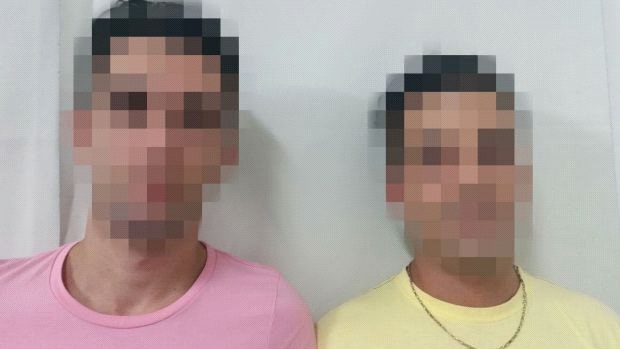
A digitally altered photo of two gay Iranian refugees, Nima and Ashkan, who say they are being persecuted at Nauru, where homosexuality is illegal. Photo: supplied
The Human Rights Law Centre and international LGBT rights group All Out have begun a petition calling on Prime Minister Malcolm Turnbull to urgently intervene and bring the men to Australia. The refugees, known by the pseudonyms Nima and Ashkan, live in the Nauruan community. They say they spend their lives confined in a tiny unit with the doors locked and window shades drawn - leaving just once a week to buy food, escorted by a case manager.
"We would love to live in a country where we can love each other without any barriers … and Australia is such a country," Nima told Fairfax Media through an interpreter, speaking on the phone from Nauru.
"Most of the time we just lie on the bed because we can't do anything … we are mentally suffering. We can't do anything else."

Further injuries the men have endured. Photo: Supplied
The men, both in their 20s, fled Iran separately after suffering persecution and headed to Australia. They met after being transferred to the Nauru detention camp and their relationship began about two years ago.
They claim to have suffered harassment from other detainees while inside the centre. After being found to be refugees and moved into the Nauruan community, they say the attacks escalated.
In one alleged assault one evening in July last year, the men were walking home carrying their shopping when their path was blocked by three local men.
The refugees allege the men asked if they were partners, which they confirmed, before the men said "fuck you" and beat them with sticks, forcing them to the ground. The refugees said they sustained bruising and were taken to hospital. Ashkan allegedly suffered concussion and was kept overnight
In an attack the following month, Nima was allegedly punched in the head by two men on motorbikes, who yelled "you fucking gays".
A spokesman for the Department of Immigration and Border Protection said it was "aware of an incident involving the individuals" and law enforcement in Nauru was the responsibility of the island's government.
The spokesman said concerns about the treatment of gay people are considered prior to a detainee's transfer to that country.
"It is not Australian government policy for illegal maritime arrivals to settle in Australia. Refugees in Nauru may apply to Cambodia for permanent settlement," he said.
Very few refugees have taken up the Cambodia resettlement option. Critics say that nation has been accused of human rights abuses, has high poverty levels and no refugee resettlement experience.
The Nauruan government had not provided comment at the time of writing.
HRLC's director of advocacy and litigation, Anna Brown, said under Nauruan law Ashkan and Nima risk being jailed for up to 14 years.
"This situation and similar ones on Manus [Island] are just so wrong ... the Australian government knowingly and deliberately allows gay men to be warehoused on tiny islands where they face assaults, prejudice and extremely harsh criminal penalties," she said.
The HRLC says former human rights commissioner Tim Wilson was notified of the case and raised it with the government. Mr Wilson, who recently resigned the post to launch a bid for Parliament with the Liberal Party, would not comment.
A spokesman for Connect Settlement Services, which assists refugees at Nauru, said it was aware of assault allegations "made by clients in June and July last year and we have provided assistance to those clients".

We recently found a greetings card sent to us a few years ago, and the card was made in 2004. Remember the date and then assess the situation in Australia at the end of 2016, with the concentration camps in Manus and Nauru where conditions are as appalling as any concentration camp anywhere in the world - and this is Australia 2016.
Weep and be revolted by the fact that this country has sunk to the lowest levels that a so-called civilised country can sink to and still claim to be a modern society, whose citizens and the politicians who represent them behave no better than a police state.
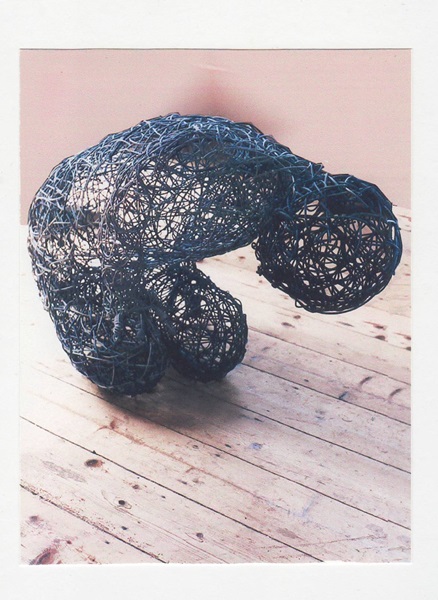
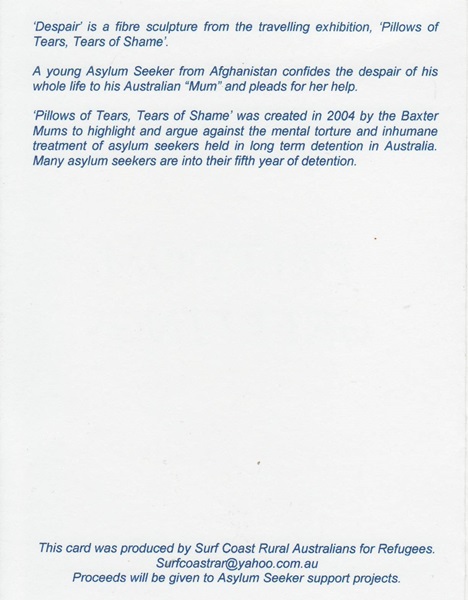
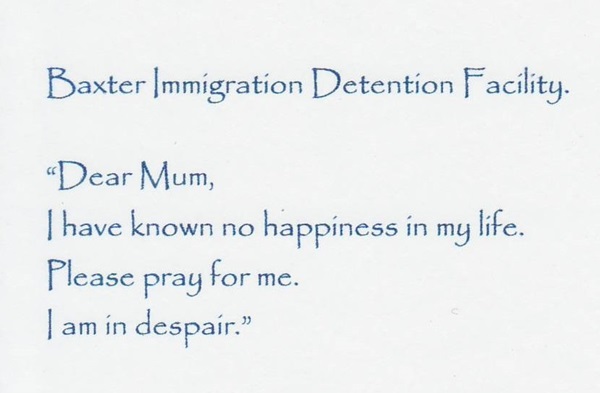
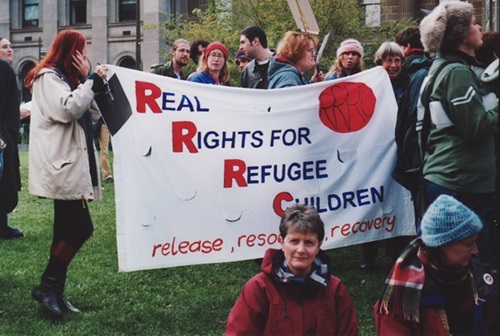



Asylum Seekers including Gay, Lesbian, Transgender, HIV/AIDS Asylum Seekers PART 1
Asylum Seekers including Gay, Lesbian, Transgender, HIV/AIDS Asylum Seekers PART 2



Reading updates will be found at: RECOMMENDED READINGS

Mannie De Saxe also has a personal web site, which may be found by clicking on the link: RED JOS: HUMAN RIGHTS ACTIVISM
MannieBlog (from 1 August 2003 to 31 December 2005)
Activist Kicks Backs - Blognow archive re-housed - 2005-2009
RED JOS BLOGSPOT (from January 2009 onwards)

This page created 10 JUNE 2011 and updated 6 DECEMBER 2016
Page 171